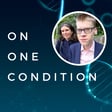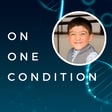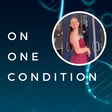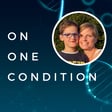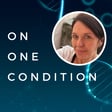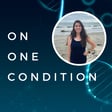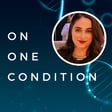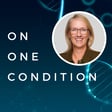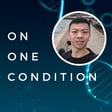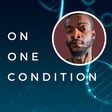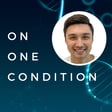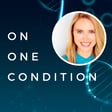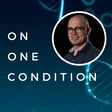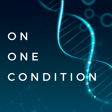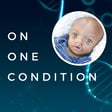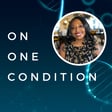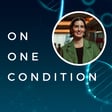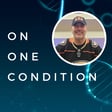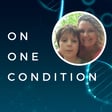Become a Creator today!Start creating today - Share your story with the world!
Start for free
00:00:00
00:00:01

Episode 43: John Muller - Inclusion Body Myositis
John lives with inclusion body myositis (IBM), a rare muscle-wasting disease. He shares how his symptoms, such as difficulty climbing stairs and playing guitar, were initially mistaken for aging, and later led to a misdiagnosis of ALS. He describes the emotional impact of living with a rare disease, the challenges of receiving an accurate diagnosis, and the frustration of the limited treatment options available for IBM. Despite these challenges, John remains committed to raising awareness and advocating for research to improve the lives of those affected by IBM and other rare diseases.
The song that John selected is Into the mystic by Van Morrison.
Transcript
Introduction and Guest Welcome
00:00:00
Speaker
Hi, I'm Sylvain Bertolo, and you're listening to On One Condition, a podcast to raise awareness about health conditions by listening to people who leave them every day. My guest today is John Muller, and we're going to talk about inclusion body myositis. Hi, John. Nice to have you on the podcast. How are you doing? I'm very well, Sylvain. Thank you and yourself. Yeah, I'm doing great. Thank you. That's good.
00:00:30
Speaker
I'm very excited about our chat today because ah or we have quite a few things that we haven't talked about in the past on the podcast, so I'm looking forward to this. But before we do get into IBM,
00:00:49
Speaker
I love starting with a song. So what song did you choose and why?
Musical Interlude and Transition
00:00:55
Speaker
Well, hey i I chose Into the Mystic by Van Morrison. He's always been a favorite of mine for as about as long as I can remember. So it was the first one that popped into my mind. And when you asked about a song, I like the ah the soulfulness of Van Morrison, the whole genre that he and
00:01:24
Speaker
originally started as a band called Them out of ah and of Great Britain, probably out of Belfast, I'm not really sure. But he's he's quite the prolific entertainer with solos and duets with with just about everybody that's existed in the music business. I especially like is his John Lee Hooker ah combination songs. but Yeah, Van is van's the man. Yeah, and he has such a a great voice. I love his voice. I do too. You've just mentioned one of my favorite bluesmen as well, Johnny Hooker. What a great combination. I had an opportunity to meet John at Chicago Motor Speedway. It's a long story, but connected to
00:02:21
Speaker
somebody in the radio business that was in Chicago promoting Van Morrison and and John Lee Hooker. I got to shake both of their hands and it was a thrill of a lifetime. i really Although it was pouring down rain and I had mud to my waist with 100,000 other people, but it was ah it was a great evening. Yeah, I bet it was. I'm jealous.
00:02:50
Speaker
ah So unfortunately we can't just talk about music. I'm sure we could talk care about it a lot. But we're here to talk about inclusion body myositase. And I want to start at the beginning for you.
Early Signs and Diagnosis of IBM
00:03:05
Speaker
So how did you realize that you have IBM? I didn't know I had anything wrong with me. I i was slowing down, having problems on stairs.
00:03:18
Speaker
I just felt it was, I was getting older. ah Most of the people in business were we're younger than me and I had a little problem keeping up with them as we walked convention floors or as we traveled through airports, et cetera. um And I i just chalked it up to, like I say, I'm getting older and that's just, well, as I'm blessed in so many ways, one being that my physician,
00:03:47
Speaker
lives down the street from me. I asked him to stop in one day as I was having more problems with the staircase. I needed a handrail and was pulling myself up as much as as stepping up the stairs. And he recognized there was, so and and this was years had gone by, six, eight years of me just slowing down.
00:04:13
Speaker
plus a canoe and hunt and fish and lots of outdoor stuff that I was having problems keeping up with my friends who were my age or close to. And and I recognized something was, I was ignoring the system symptoms. I would but really encourage anybody that has these symptoms, which I list on our ah website, which there's 15 pretty basic ah Symptoms to look through that if you're experiencing them get it checked out. I I didn't ah Physician came over and watched me on my coming up from the music room and and I could no longer hold the strings down on my guitar and So there were just some things and he said I I don't know what's wrong, but you but there's something something's up and from that point I
00:05:11
Speaker
We started down the road of of a rare disease, not having any idea that it was a rare disease or what was wrong, but through rheumatology and different neurologists, neuromuscular specialists, different tests, EMGs, spinal tap or lower lumbar, they call it. It did tons of blood and X-rays. We came to the conclusion.
00:05:37
Speaker
they came to the conclusion and diagnosed me with ALS. That was my first diagnosis. Which is not inclusion body myositis? No, it is not. I assume it was a misdiagnosis, is that right? Yes. By a massive number of different board-certified neurologist, rheumatologist, et cetera. So yes, it was a misdiagnosis, but it's ah it's a disease that is often misdiagnosed. and And many people will go many years without a diagnosis. and And that's not untrue for many of the rare diseases. Keep in mind that there's, they say now, 10,000
00:06:31
Speaker
rare diseases and that affect us and it's impossible for your primary to know about all of them or or really any of them because some of them are just so obscure yet um ah they know something's wrong but not what.
00:06:49
Speaker
Yeah, yeah. Well, ALS is quite a tough diagnosis to get because it can progress very quickly. So how were you when you got this diagnosis? Well, Sylvan, you know what, I don't think I've ever told this story to anybody, but I'll ah make it short. It's a devastating diagnosis to receive um after multiple um neurologist and neuromuscular specialist, that diagnosis ah kind of shut me down. I had to come to grips with that. My wife and I kind of drew the shades and and ah had our time of tears. and And then we got a stiff upper lip, I think, as the
00:07:42
Speaker
as the British might say, and tried to deal with this the best that we could. ah Came to grips with it the best that we could. We thought we had a good handle on on what it meant. I don't really know if that's true, but for three months we lived with that diagnosis and notified the children and started making plans to exit ah this this world. and um and went to on my way to another very famous place here in the United States in in Minnesota, who I was fortunate enough to have the inside track to go see. And they recommended, I checked, with a local local organization,
00:08:30
Speaker
i very famous in the world of neurology. And so I did. I live in Kansas City. and ah They met me and got me enrolled and in different protocol with ALS psychiatrists and social workers, et cetera. Anyways, I had a neurologist walk in, shake my hand and ask me what I was doing there. What are you doing here? And I said, well, sir, I'm enrolled in your ALS protocol program. And he said, I don't know why you don't have ALS. I have 400 ALS patients and you're not one of them.
00:09:08
Speaker
So here I'd met a guy for two minutes who instantly diagnosed that I had something different and he called it inclusion body myositis or IBM. Of course, he said, look, this is no picnic, but it's, it's not ALS. Okay. And was it a relief instantly or not? Instantly, instantly my wife and I reacted ah very emotionally and held each other and and held each other's hand as even we were a little shaken, literally. yeah and and And now it was time to be on the road of a rare disease, something we had never planned for. um I was 64, 64, almost 65 at the time. So we were planning on on retirement. That was part of the
00:10:07
Speaker
upcoming ah world, for the eat but certainly we didn't plan on retiring in this manner. yeah this was This was not a life that we had that we were choosing, it was a life that we were now
Living with IBM: Symptoms and Challenges
00:10:21
Speaker
living.
00:10:21
Speaker
Yes, yeah. And going back to what you said about the symptoms, so like not being able to pull the strings on your guitar anymore, finding it difficult to walk upstairs. Was it due to muscle weakness or was it anything else? It it was, Sylvan. It was muscle weakness that I didn't recognize. um I didn't realize. and ah Many of your listeners may not either. there're There's no muscles in your hand the hand. The muscles that work your hand are in your forearm. So I was just not able to play as cleanly as I had in the past. So that was a concern. And again, thinking, well, I'm older and, and you know, maybe I ignored the symptoms, but it was definitely
00:11:21
Speaker
muscle wasting, not something I recognized at the time, but but that's exactly what was going on. and Okay. Moving back to the diagnosis for IBM, did it mean that you had access to any treatment or any research thanks to getting the right diagnosis? Thank you for asking that, Sylvan. There's I mentioned the 10,000 rare diseases, 95% of them have no ah treatment, of certainly not a cure of any kind. um IBM is ah still a a very unknown disease around the world. There are many, like I said, rare diseases, probably
00:12:15
Speaker
350 million of us around the world that have a rare disease. As far as IBM goes, ah there are no treatments. ah You can exercise is is and it has to be done properly. um eat a Eat a balanced and and good diet. ah but These are the things that they direct you to, but there really is no currently ah no treatment There are treatments for other myositis, but inclusion by myositis is I compare it to a ah million piece jigsaw puzzle. And every now and then, one of those pieces have another million pieces. So it's a combination of ah misfolded proteins. In the T cells, there's a ah a genetic component to it.
00:13:11
Speaker
ah They believe ah what causes it They don't know but there are some interesting statistics to prove that there is an outside stimulant involved in getting or catching or whatever the inclusion body myositis and I use the I use the military veterans as the ah Kind of one of the benchmarks And again, even the numbers are not really that accurate because it's it's measured in different ways at different places around the world. But it's commonly known that 5, 8, 7 per million people will contract inclusion body myositis unless you're a veteran. And then the number goes up to 198 or
00:14:08
Speaker
200 per million. So a significant difference between the general population and veterans. I did not serve, but I'm in that group of people that was diagnosed with IBM, you know, the five per million.
00:14:28
Speaker
And again, I don't want to be quoted on either of those numbers just to say it's a very small number per million versus a much larger number per million for for the for the veteran community. And it's not recognized by all ah veteran organizations, meaning veteran medical organizations, as a disease that is acquired through military service. but To me, it says something about either maybe burn piles or vaccines, maybe a drug or alcohol or maybe a reaction to some environmental ah outside stimulant. when And they have no idea what but that might be. yeah another Another interesting point that they have determined getting away from the veteran situation, but that there are
00:15:24
Speaker
connections between other diseases and I would say probably most diseases that connect us in many ways. For IBM, there's a very, very close connection to ALS and a very close connection to Alzheimer's. okay So the Alzheimer's studies I'm very interested in because the same misfolded ah ah T cells or cells, proteins,
00:15:55
Speaker
Let me also say my ADA just kicked in, I guess, ADHD or whatever. um I'm not a doctor, you know, I just, I'm a patient. um and And so I try to read what I can. And so no one listening should take any of my advice as any medical fact, just ah my opinion and things that I've read. yeah But Alzheimer's,
00:16:22
Speaker
is when these proteins, misfolded proteins, attack ah the brain. And when it does, these same misfolded proteins cause Alzheimer's. If it attacks the ah motor neurons or your neurological system, it becomes ALS. And if it attacks your um muscular skeletal muscle system,
00:16:50
Speaker
it becomes inclusion body biocitis or IBM. Okay, so that makes sense. Similar protein, different areas of the body that are affected, which means that you get different symptoms, which in in a way can explain the the misdiagnosis with ALS then. Excellent point, Sylvan. Yeah, it's a, ah I think it's probably more common than not of a misdiagnosis, not only in my case, but for all of or many of the rare diseases because it's, ah and well, it's rare. The fact that the fact that there's so many and and so many of us in that community makes it ah almost that it's not rare because there's such a, ah you know, it's one in 10.
00:17:49
Speaker
or higher that they determine is affected in one way or another by a rare disease.
Advocacy and Awareness Efforts
00:17:56
Speaker
yeah yeah the And the reason I continue to say rare disease is minus inclusion body myositis, that's what I focus on and of course that's what our organization gettingup dot.org ah does to go with research for inclusion body myositis. But remember, when I was diagnosed, I didn't know what I had. And I wouldn't want anybody to hear this or any other information and say, Oh, I don't have that. So, um you know, I'm okay. It's not true.
00:18:33
Speaker
in the rare disease community there's 35 million of us and we're not really given the resources because of all of the needs not only in our country but around the world for for ah nutrition and and housing and and you know there's dollars can only go around to so many places. there's There's lung disease, there's heart disease, there's a lot of people that are looking for either support financially or or medically or advocacy for a lot of different diseases that are certainly more prevalent
00:19:19
Speaker
ah than the rare disease community. But when I found out IBM, I started looking in, it will not affect my longevity, by the way, Sylvan. I will live most likely the same number of years that I would have ah without this disease. But my mobility will continue to deteriorate.
00:19:47
Speaker
until my muscles don't allow movement. So I will become 100% dependent on a caregiver. at At some point down the road, I would anticipate I'll be in a wheelchair in a couple years. I anticipate I will have modified my home significantly within a couple of years after that. And of course, I'm making all of this up. No one has any idea.
00:20:15
Speaker
what my timeframe is because each one of us progresses differently. I happen to be on a pretty slow track and and feel really lucky ah to be with the team of physicians that I'm that i'm with.
00:20:31
Speaker
Yeah, yeah. Well, talking about that, the relatively, sorry, low progress. So I know that you are part of a phase one clinical trial. First of all, I'm really interested in in hearing about it, but do you know if it's effectively new positively yet or not?
00:20:58
Speaker
I don't know, Sylvan. I don't know if it's slowed the progression or stopped the progression or has had no effect. Clinical trials are run very secretively. So all I have is my opinion of of what's happening. I was treated on one half of my body.
00:21:21
Speaker
I do know, and I don't know how much I can say here, but i I do know that the few number of people that were in this trial, that all of us lived. So there was nothing within, the in a phase one, typically what they want to find out is, is this is this safe? Yes. They wouldn't have started it if they thought people were going to start dropping off. so ah But they had good indications that this was ah safe to to proceed. ah I don't know exactly the year, but it took them six or seven years from the time that they had the idea and started submitting to our country's Food and Drug Administration for approval to proceed.
00:22:12
Speaker
They had quite a few hoops to jump through. I don't know what they all were, but I do know it was a six or seven year process to get from ah that to starting the trial. Again, I was selected. I must have been right in the sweet spot to get in that trial. i It was right at the peak in COVID time-ish, so there were always you know delays and things. but It certainly didn't hurt anything and i I feel good. I look good and I think losing whatever amount of muscle strength I have equally ah throughout my body or I am maintaining
00:22:57
Speaker
depending on how you want to yeah how depending on how you want to say it. Yeah. Yeah. So how does it feel to to be part of a trial, which is like I work in the clinical industry. I admire everyone who takes part in a trial because you're helping people who will benefit from treatments in the future. How does it feel not knowing if it's actually helping you in any way? Well,
00:23:26
Speaker
It feels great. and And it feels great because there's hope that something is happening with no treatments, with no opportunity to ah make a difference. And I don't know if it's ah just a human thing to want to fix it. I don't believe I'm going to fix it by myself, but if I can help in some way. The trial seemed obvious. Also, once I was in the trial, by six, nine months, I kept looking at a way to give back. I tried to join different organizations and they didn't seem to align with my paradigm. So I started my own. And that has helped. That has helped many
00:24:25
Speaker
many people but uh the most and because i'm a typically self-centered human being um it's it's helped me the most it's helped me the most in that i've been busy i've been in the loop as you say i i communicate with some 5 000 people of a weekly uh with different social media and so forth also the constant contact i encourage anyone that would like to be ah part of those mailings, to please get in touch. I'd be happy to add you to the list. we We've sent things out to different people they need. ah We raise money. We don't ask money for any funding or support, financial support, that is, from patients. We look to corporate community for those things. I feel like patients have enough on their plate. It doesn't have to be IBM related. Again, we're
00:25:24
Speaker
but but that is our primary focus. Yeah, it it feels great. we We took this Rare Disease Day, which was February 29th this year, a very rare day, and we reached a million people with PSAs that we ran from New York to Baltimore and had very successful radio campaign.
00:25:50
Speaker
that a pharmaceutical company asked us to do a proof of concept. it was but but They asked not to be identified or part of the, they just wanted to see what would happen and what would the results be. Our focus was underserved communities. and We did it primarily on AM m radio, primarily on urban stations and reached ah over a million people and had an incredible ah impact on our website ah traffic and who felt that it was very successful. so So how do I feel? How do I feel about being in a trial and not, well, i I'm keeping busy. yeah i I think that that's important. I do my exercises each day, which is primarily walking and
00:26:45
Speaker
little rubber balls and I use a tens. I have a few things that I do ah trying to keep up and then I can spend a few hours each day ah running the nonprofit yeah and the rest of the time I spend with the friends and family and and try to have as active and normal life as as I would if I didn't have Inclusion Body Biosciences. Life goes on even when you are in a clinical trial.
00:27:17
Speaker
And that's what I'm hearing. And it's great. That's what it should, it should do. As long as it doesn't reduce your quality of life, then, and hopefully it means that it reduces progression. Then that's win-win. That, yeah apps app absolutely so. You're right on top of that, of course. But there's, there's also to be involved, to be part of the advocacy ah makes you stay knowledgeable, stay on top of the things that are happening ah around. And some of them are very exciting. There are some just ah to a few really exciting trials ah that are happening now. And I certainly look forward to those
00:28:08
Speaker
someday being part of the treatment. It's just so hard to get drugs over the finish line and into the public. So many of them don't make it that you just can't put too much in any one thing.
00:28:23
Speaker
ah By the way, I could have this conversation from now till tomorrow morning, but i i'll I'll stop there as far as trials and and and research goes. But I would emphasize with your listeners that ah positive thinking, your positive mojo, your prayers, your meditation, ah that time that you spend inside yourself in is invaluable. It's what allows you to um focus on the positives in your life. I forget what civil rights leader said, get your mind straight and your ass will follow. ah But that's sort of where I think it's come to grips with what it is you have to deal with.
00:29:17
Speaker
Some of them are very, very difficult. Some of them you may not be able to come to grips with. I'm not here preaching, just that for me, it made a big difference. Yeah. And you're right. i mean Mindset is very, very important. It's difficult to keep a positive mindset all the time. Well, you can't keep a positive mindset all the time, but in general, but it is important to keep going. It feels like the ALS diagnosis was quite hard to receive.
00:29:52
Speaker
And it doesn't make IBM any better, but ah it sounds like you've really decided to take it head on and do a lot about it rather than waiting for it to happen. So it's really incredible. Delvin, that ALS diagnosis is devastating.
00:30:15
Speaker
It was something like I say, I think I came to grips with the best of my ability, but I was not able to process anything the way I had prior to that diagnosis, the way you process everything after that changed. So this is going to sound perhaps a little strange, but when we received, when I received the IBM diagnosis,
00:30:46
Speaker
It was a joyous moment. It was it wasn't ALS. So anything at that point became a blessing. yeah So, yeah, I i have taken um that attitude of, wow, it could have been a lot worse. In fact, it was a lot worse. I didn't like that diagnosis. ah I liked the new diagnosis better.
00:31:16
Speaker
Yeah. Yeah.
Personal Reflections and Positivity
00:31:17
Speaker
Going back to your organization, getting up, why did you name it that way? Well, because I was having problems getting up out of a chair. It's the, it's sort of the, um, one of the standards. Uh, if you're going to be in a trial, you have to be able to get up out of a chair, use your arms.
00:31:42
Speaker
you need a chair with arms. I look around the room as I enter. um It's on my mind pretty much all the time. ah Curbs, steps, ramps, and chairs are things that I pay close attention to. I can get up out of a chair with my arms and and a lot of restaurant chairs don't have arms. So I've got to position myself in the spot of the room where I can either keep the chair against against the wall behind the table, if that's an option, so that I can use it to push myself off. it's a I've got a lot of little tricks you can do. There's also ah a little device that will lift you. You bring it with you. It's sort of a spring-loaded little deal that will kick you up. But can you have to be able to be in a trial, at least the ones I've seen,
00:32:42
Speaker
you have to be able to get yourself out of a chair without an assistant device. So no Walker or Kane or that little gadget I was speaking of. Okay. You have to use your arms and stand up. So getting up became sort of the, my, uh, uh, war cry or battle cry in that I have to be able to get up once I can't get up. I know that I'm now,
00:33:11
Speaker
on a different part of the journey. Okay. Makes sense. So you said that other organizations didn't really fulfill what you wanted to achieve. Are you achieving what you want through getting up now? I am. it's Besides the personal fulfillment. i but We have a group of volunteers and patients that helped me run ah this organization. We've got a 10 dozen, 10 dozen, maybe corporate sponsors that help us fund our activities. And and we're growing with those. We but have another 30 or 40 smaller corporations that provide ah other services for us that help us run ah this organization. So lots of positive things have happened. In fact, we will do a presentation check
00:34:11
Speaker
in the next couple of weeks for $60,000 to be used ah for medical research, for neuromuscular medical research. And we helped start and seed fund a phase ah one trial that is now already to a phase two trial in a a ah wearable ah device that will measure muscle activity. Right now they use a form where they answer 10 questions, 4 points each and it's subjective because I have the same score today that I did the day I went in when the reality is I've deteriorated significantly where the questionnaire doesn't ask can you bend down and
00:35:03
Speaker
pick up a small piece of onion that jumped out of your frying pan. No, I cannot do that. But I could do it when i when I showed up, but it's not one of the questions. This this wearables, these wearables, which I think will be something similar to, you know, like an Apple Watch. I've helped with the help of many, many others to move the ball forward just a little bit. The alignment that I looked for in other organizations where Many of them were top heavy admin, top heavy management. Many of them were paid positions and so forth, and they are just fantastic organizations. I just couldn't find a place for myself in there to to do it. In fact, the mentor that I went to is in is ah North London, who has been
00:36:00
Speaker
just incredibly helpful in for me in every way to make sure that I could be successful. There's a group in Great Britain called Beacon for Rare. Recently, they changed their name a couple of years ago. I don't know what it was, but Beacon is a ah group that my friend Blaine has nurtured and mentored me along the way, and which has allowed me to become connected to ah many many, many international organizations. ah Even those people are on our honorary chairperson.
00:36:38
Speaker
aboard through France and the Netherlands and all over the United States and Australia ah because of the people that I, in one way or another, met through a connection at at Beacon. I don't speak with them as often as I used to, ah but I could tell you that they were certainly a mentor that put me on the right track.
Closing Thoughts and Gratitude
00:37:05
Speaker
but That's really good to hear about the the support that you've had. ah it's It's interesting because no matter how many organizations there are, I think, especially in the rare disease space, there's still room for more. And I think every single one plays a big part in raising awareness, in in getting funds for research and so on. So great, very well done to you.
00:37:35
Speaker
So I think that takes us to to the end of our interview, but I love asking that question to everyone. ah that's thats I love the answers that I get from it. So what's your happy place, a place where you feel at peace? Oh, that's a great question. Wow. ah You know, and home is always my favorite destination. um In the year 2020,
00:38:05
Speaker
20 at the end of my working career. I had done 102 flights that year, some overseas, some mostly in North America. So I have a lot of friends around the country and restaurants that I enjoy. And so my happy place is with people that that I love and and that love me. And I really do think that love is the thing that connects us all. Even Einstein spoke of the unifying energy of the world is is love. So we need a great big love bomb to be dropped on our on our world and connect us in a deeper and and more loving way. So I just have a happy place. I try to have it everywhere that I am, Sylvan. and and Amazing. My favorite destination is
00:39:03
Speaker
Definitely when the airplane is flying to home. Okay. Well, a happy place that can move with people, but then you're you're always happy to to come back home. Yes, sir. That's great. Yes, sir. Can you remind me how old you were when you were diagnosed? I was 65 and I am now 67.
00:39:26
Speaker
In two years you've started your own organization, you've raised money ah to fund clinical trials, you've taken part in a clinical trial yourself. I think you're a defying age and really I think that's a a great message for for anyone who would think that after a certain Age you need to slow down. I don't think that's true. I think you're really embodying how keeping going can give you or help you with the the Positive mindset that you were talking about earlier. I agree. Yes, I agree
00:40:11
Speaker
Well, John, it's been amazing talking to you. I really am impressed with what you do. And and I thank you again for taking part in the clinical trial. That's extremely important. And also on top of what you're doing outside of that. So congratulations. Thank you, Sylvain. And thank you for the opportunity to share my story today.
00:40:37
Speaker
It's a story that 350 million people in the world could share with you, that 35 million Americans could share that story with you. It's a a community of people that are unique in that they are rare. And yet there's enough of us that it's it's it's really not that rare.
00:41:05
Speaker
Your opportunity given to me is so very gracious. I thank you. you ah You're a really good man and I appreciate being a part of your movement. Thank you. I appreciate that.
